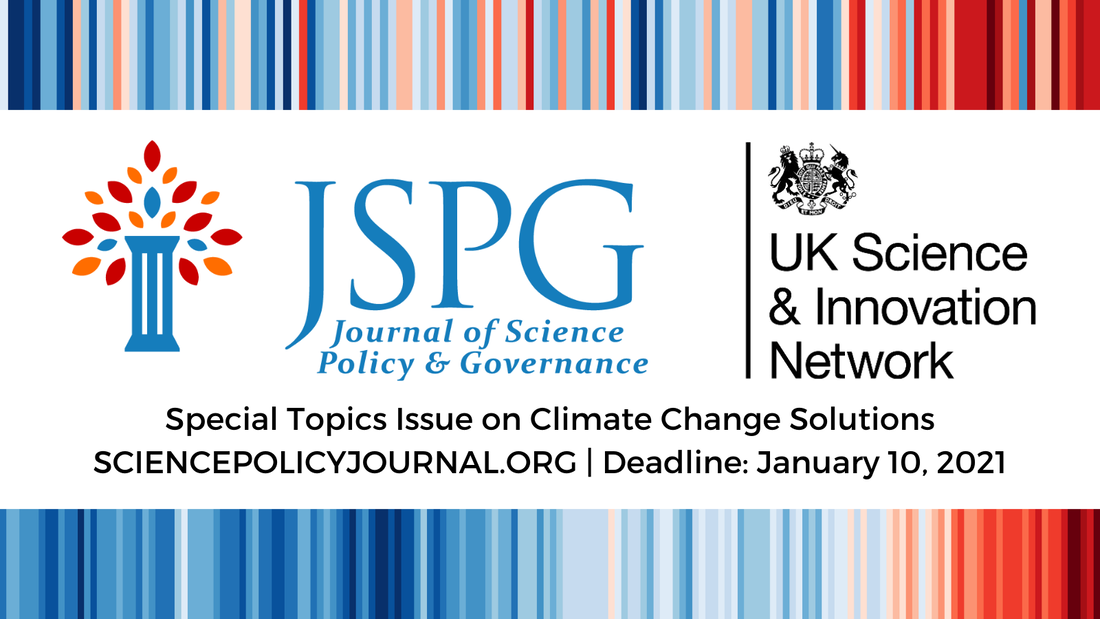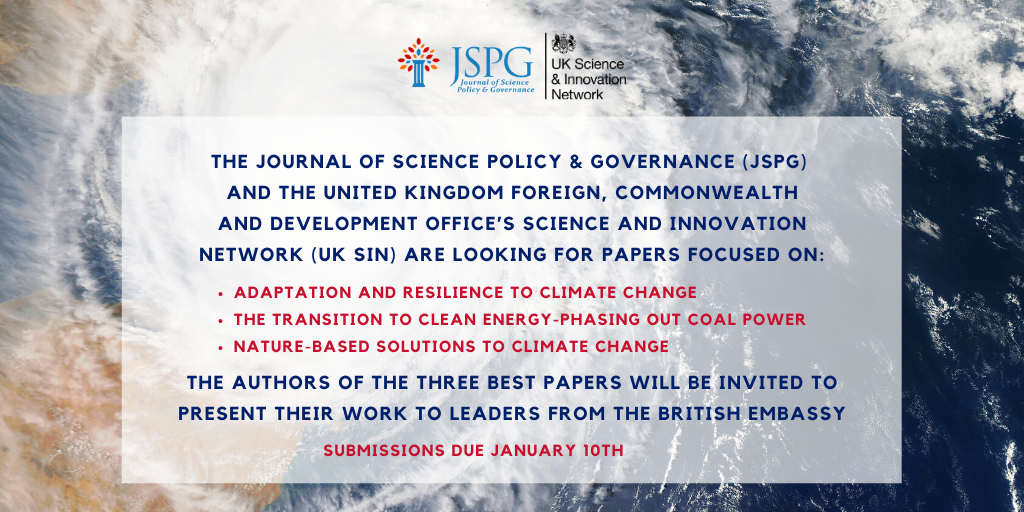Journal of Science Policy & Governance and UK Science and Innovation Network
Special Topics Issue for Climate Change Solutions — Call for Submissions
The deadline has passed. Read the issue here.
Follow JSPG and share this call for papers on Twitter, Facebook, LinkedIn, Instagram, and YouTube. Join our monthly newsletter.
There are no words to describe the horror of watching forests burn, reefs disappear and habitats disintegrate. Across the world, young people are demanding change - we know that as a global community we have got to curb emissions, develop energy solutions and invest in innovative resilience. And we know we need to pick up the pace. The UK’s approach at the upcoming COP26 will emphasize this urgency, working with our partners in government, academia, industry and civil society to accelerate global climate progress. We’re delighted to partner with JSPG on this special issue. Innovative policy solutions that are powered by science and the passion of young leaders are key to making the changes we so desperately need."
— Ronit Prawer @RonitPrawer, Regional Director, UK Science & Innovation Network
Millennials, Generation Z, future generations and their families will be most directly hurt by our planet’s worsening climate environment. Students and early career scientists, engineers and policy leaders are well-positioned to develop fresh, bold but actionable ideas to combat the threat of climate change. JSPG is proud to partner with the UK Science and Innovation Network to engage early career researchers with the United Nation’s COP 26 dialogue and we look forward to advancing our mutual goals"
— Shalin Jyotishi @ShalinJyotishi, CEO, Journal of Science Policy and Governance
CALL FOR SUBMISSIONS:
The Journal of Science Policy & Governance (JSPG) and the United Kingdom Foreign, Commonwealth and Development Office’s Science and Innovation Network (UK SIN) are pleased to launch a joint call for papers for a special topics issue around climate change solutions aligned with the 2021 United Nations Framework Convention on Climate Change (COP 26) taking place in Glasgow, Scotland from November 1-12, 2021.
Students, post-docs, policy fellows, early career researchers and young professionals that meet JSPG's author criteria guidelines are encouraged to consider how public policies or governance structures could address global climate change via the lenses outlined in the priority areas below which are aligned. UK SIN and JSPG seek to engage a wide range of young voices, including but not limited to researchers, practitioners, NGOs, and industry representatives.
Follow JSPG on Twitter, Facebook, LinkedIn, Instagram, and YouTube. Join our monthly newsletter.
Students, post-docs, policy fellows, early career researchers and young professionals that meet JSPG's author criteria guidelines are encouraged to consider how public policies or governance structures could address global climate change via the lenses outlined in the priority areas below which are aligned. UK SIN and JSPG seek to engage a wide range of young voices, including but not limited to researchers, practitioners, NGOs, and industry representatives.
Follow JSPG on Twitter, Facebook, LinkedIn, Instagram, and YouTube. Join our monthly newsletter.
| JSPG & UK SIN Call for Submissions Flyer |
Best Paper Competition:
In addition, JSPG and UK-SIN will assemble an expert review committee to identify three best papers whose authors will be invited to present their work to leaders from the British Embassy, followed by a forum about implementing policy solutions and engaging young people.
Priority Areas & Guiding Questions:
The competition will focus on three of the UK’s priority areas for COP 26: Adaptation and Resilience to Climate Change, The Transition to Clean Energy-Phasing Out Coal Power, and Nature-Based Solutions to Climate Change.
Adaptation and resilience to climate change
Even if we stopped emissions today the world would still need to deal with significant climate disruption. Climate change is already having an impact on us all but the most vulnerable are hit hardest. Many communities face an existential threat - to lives and livelihoods as well as existing and future development. Therefore, stimulating greater action on adaptation and resilience is central to COP26. Countries are rightfully concerned that large numbers of people will need assistance to respond to the risks, and cope with the impacts of climate change. Getting action underway in the right places critically depends on ensuring that plans of action can reach and respond to those most in need.
Even if we stopped emissions today the world would still need to deal with significant climate disruption. Climate change is already having an impact on us all but the most vulnerable are hit hardest. Many communities face an existential threat - to lives and livelihoods as well as existing and future development. Therefore, stimulating greater action on adaptation and resilience is central to COP26. Countries are rightfully concerned that large numbers of people will need assistance to respond to the risks, and cope with the impacts of climate change. Getting action underway in the right places critically depends on ensuring that plans of action can reach and respond to those most in need.
- What technologies, scientific or economic data, or strategies are needed now to enhance early warning systems for vulnerable communities?
- How can policymakers design effective resilience strategies which support social inclusion and equity?
- What national and international financial and political conditions will help individual regions adapt to the consequences of climate change?
The Transition to Clean Energy-Phasing Out Coal Power
To meet the goals of the Paris Agreement, the global transition to clean power needs to progress four times faster than at present. Solar and wind are already cheaper than coal power in most countries, and their cost continues to fall rapidly. But over 50 countries are still planning new coal plants. We want to bring countries, development banks, investors and civil society together to ensure that every country considering new coal plants can access a clean power investment and assistance offer that is more attractive. If we work together, we can enable all countries to make the transition to cheaper, cleaner power at an earlier date.
To meet the goals of the Paris Agreement, the global transition to clean power needs to progress four times faster than at present. Solar and wind are already cheaper than coal power in most countries, and their cost continues to fall rapidly. But over 50 countries are still planning new coal plants. We want to bring countries, development banks, investors and civil society together to ensure that every country considering new coal plants can access a clean power investment and assistance offer that is more attractive. If we work together, we can enable all countries to make the transition to cheaper, cleaner power at an earlier date.
- What new skills, scientific or economic data, tools, or strategies are needed now to facilitate a successful transition to low-carbon energy production?
- How can national and international actors tailor policy and programs to support a clean transition given regional variability?
- What aspects of the current power sector hinder the development and adoption of new clean technologies, and what reforms are needed to reduce these barriers?
- What resources and programs can support communities affected by the shift away from fossil fuels, and promote a just transition?
Nature-Based Solutions to Climate Change
Natural systems are on the front-line of the fight against climate change, both because they are impacted by climate change, and also because they provide us with vital tools to help us adapt to rising temperatures, and to lock up and store carbon. Our land and Ocean are under threat from climate change, but can also contribute to the solutions. If we are to meet the Paris Agreement, we need a full scale transition of our energy systems, and a transition in the way we use the land and Ocean. Agriculture, forestry, and land-use contribute 23% of global greenhouse gas emissions, but our land and coastal marine ecosystems could provide up to a third of cost-effective climate mitigation.
Natural systems are on the front-line of the fight against climate change, both because they are impacted by climate change, and also because they provide us with vital tools to help us adapt to rising temperatures, and to lock up and store carbon. Our land and Ocean are under threat from climate change, but can also contribute to the solutions. If we are to meet the Paris Agreement, we need a full scale transition of our energy systems, and a transition in the way we use the land and Ocean. Agriculture, forestry, and land-use contribute 23% of global greenhouse gas emissions, but our land and coastal marine ecosystems could provide up to a third of cost-effective climate mitigation.
- What characterizes a successful political commitment to the adoption and implementation of nature-based solutions to climate change? How can governments ensure that the benefits of these solutions are equitable?
- How can private and public financial markers support nature-based solutions to support livelihoods, strengthen resilience, and deliver carbon savings?
- How can agricultural producers reduce their impact on carbon-rich ecosystems, while investing in sustainable production?
- How can policymakers consider nature-based solutions to support coastal resilience and marine biodiversity?
NEW: Watch our Climate Policy on the Road to COP26 breakout webinar videos as primer to our issue!
|
Introductions & Adaptation and Resilience to Climate Change Breakout Session
|
The Energy Transition & Nature-Based Solutions Breakout Sessions
|
Submitting to JSPG:
- Please review submission guidelines found here and the guiding questions for this competition (above).
- Submissions have closed for this competition. Click here to learn about other special issues and deadlines.
- For any additional questions about, please don't hesitate to contact us at [email protected] with "JSPG-UK SIN Issue " in the subject line.
Background:
COP 26
Established in 1995, the Conference of Parties (COP) is the decision-making body responsible for monitoring and reviewing the implementation of the United Nations Framework Convention on Climate Change. For the first time, the UK will host the 26th UN Climate Change Conference of the Parties (COP26) at the Scottish Event Campus (SEC) in Glasgow on 1 – 12 November 2021. Italy will host a number of key preparatory events such as a Youth Event and the Pre-COP Summit. COP 26 is set to incorporate the 26th convention, the 16th meeting of the parties to the Kyoto Protocol and the third meeting of the parties to the Paris Agreement.
UK SCIENCE AND INNOVATION NETWORK
The Science and Innovation Network (SIN) has approximately 100 officers in over 40 countries and territories around the world building partnerships and collaborations on science and innovation. SIN officers work with the local science and innovation community in support of UK policy overseas, leading to mutual benefits to the UK and the host country. In the USA, SIN works with British and American researchers across several priority areas, supporting international collaboration on the scientific response to COVID-19, health and life sciences, the digital economy, AI and Robotics, clean energy and the UK’s priorities for COP 26. Visit http://bit.ly/2EG0Q3f and follow on Twitter @UKSINet to learn more.
Established in 1995, the Conference of Parties (COP) is the decision-making body responsible for monitoring and reviewing the implementation of the United Nations Framework Convention on Climate Change. For the first time, the UK will host the 26th UN Climate Change Conference of the Parties (COP26) at the Scottish Event Campus (SEC) in Glasgow on 1 – 12 November 2021. Italy will host a number of key preparatory events such as a Youth Event and the Pre-COP Summit. COP 26 is set to incorporate the 26th convention, the 16th meeting of the parties to the Kyoto Protocol and the third meeting of the parties to the Paris Agreement.
UK SCIENCE AND INNOVATION NETWORK
The Science and Innovation Network (SIN) has approximately 100 officers in over 40 countries and territories around the world building partnerships and collaborations on science and innovation. SIN officers work with the local science and innovation community in support of UK policy overseas, leading to mutual benefits to the UK and the host country. In the USA, SIN works with British and American researchers across several priority areas, supporting international collaboration on the scientific response to COVID-19, health and life sciences, the digital economy, AI and Robotics, clean energy and the UK’s priorities for COP 26. Visit http://bit.ly/2EG0Q3f and follow on Twitter @UKSINet to learn more.

Warming stripes graphics from Ed Hawkins, National Centre for Atmospheric Science, University of Reading / CC BY-SA



